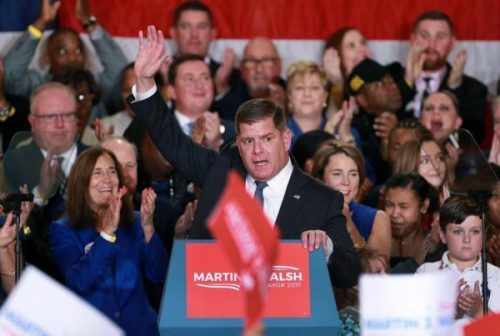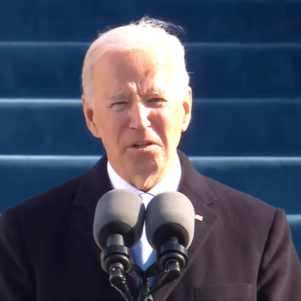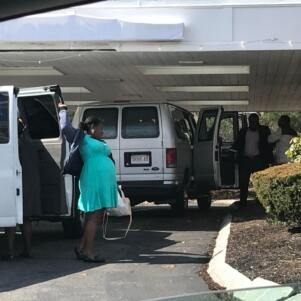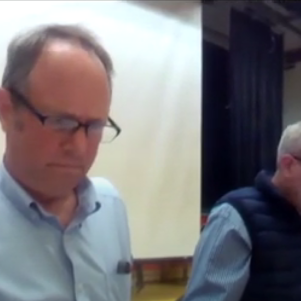Talk of Mayor Marty Walsh Going National is Prematurely Foolish
By James P. Freeman | November 21, 2017, 15:28 EST

“Believe or not I’m walking on air
I never thought I could be so free
Flying away on a wing and a prayer, who could it be?
Believe it or not it’s just me”
— Theme from The Greatest American Hero (“Believe It or Not”)
Only in homogeneously progressive Boston can pell-mell fantasy exceed partisan reality.
Appearing on public television’s Greater Boston a day before Election Day to promote his book Bobby Kennedy: A Raging Spirit, MSNBC’s Chris Matthews, former aide to the late House Speaker Tip O’Neill, was getting a second thrill going up his leg. When asked who in the Democratic Party today is closest to the late senator (presumably in temperament and spirit), Matthews responded with understated hyperbole: “Maybe the mayor here.”
And on WCVB-TV’s Sunday political program OTR five days after Election Day, the usually rational Patrick Griffin was clearly under the influence of hypnosis. Or something else. When asked during the roundtable discussion who had the “best week,” the Republican strategist responded with overstated gusto. “Marty Walsh!” Where the mayor, newly reelected, is now poised and positioned to begin a “national narrative.” Well.
Cue the needle scratching over the record.
With little enthusiasm (just 27 percent voter turnout in the general election; 14 percent in the primary), little competition (his challenger lost by over 30 percentage points), and little in the way of transformational advancement during a single term (understandable after following the longest serving Boston mayor, the late Thomas Menino (five terms, 1993-2014)), Boston Mayor Marty Walsh won re-election. And, summoning ghosts in machine politics, Walsh is — so say observers — now worthy of higher office in Massachusetts and, possibly, a position in national affairs. Play me a new song.
Walsh’s parochial progressivism may in fact appeal to those outside the contours of Route 128 and I-495. And that may even extend beyond, to the hills of Williamstown and West Stockbridge, if he were to seek statewide office. But it stops there. (Besides, he will have to wait until 2022 to run for governor, when, presumably, Charlie Baker will be leaving, with the state in better condition than when he found it, after serving two terms.)
Thrilling for conservatives, Walsh’s platitudinous progressive record will play like warped vinyl on the national stage. It will be punched through with holes, and its collection of Democratic covers will be relegated to the bargain bin of bad ideas. Like abandoned 45s.
Still, it will be fun listening. (Will he reprise Hillary Clinton’s “Listening Tours”?)
How does Walsh propose to solve problems in the country that he hasn’t been able to solve in the city or the commonwealth? The playlist is long but exposes progressivism’s universal shortcomings: affordable housing, income inequality, climate disruption, sanctuary cities (some calling for sanctuary states), and public education.
And his first forays into the national spotlight proved opportunistic and potentially disastrous: He essentially blamed his hyper-interest in Boston’s 2024 Olympic bid as a form of payola, a political payoff to honor the legacy of a commitment made by the Menino administration. No friend of the First Amendment, he essentially suppressed freedom of speech and freedom of the press during the monstrously overblown Free Speech rally last August on Boston Common, despite favorable media coverage. That won’t work on the National Mall.
In many regards, Walsh is instinctively progressive but he has learned lessons from his Massachusetts mentors.
If you can’t fix it, expand it. Former Governor Deval Patrick proposed in 2013 massive growth of the state’s transportation system, while he ignored the troubled MBTA. If you can’t improve it, market it. Senator Elizabeth Warren’s persistent message in tweets and books is that ever more government is what is needed to make America great again.
Walsh hasn’t written any books, but that didn’t stop him in 2016 from actually issuing a suggested reading list to all Bostonians. Reading is not fundamental in Boston. The booklist directive reflects the new soft sell of progressive bullying: from the cold engineering of public power to the warm “engagement” of like-minded citizens. For Walsh’s Boston (like Warren’s America) believes in diversity of all aspects of life. Except thought. Or political party.
Walsh can’t even claim one thing that Patrick and Warren could: reaching across the aisle to work with Republicans. Because there are no Republicans in Boston government.
City Hall is not a standard steppingstone to the Oval Office. Only two mayors have gone on to become president of the United States. The first was Grover Cleveland, former mayor of Buffalo, New York (1882), who is the only president to serve two non-consecutive terms (1885-1889 and 1893-1897). And the last was Calvin Coolidge, former mayor of Northampton, Massachusetts (1910-1911), who, as vice president, became president in 1923 when President Warren Harding died of a heart attack. Coolidge is the only American to be a mayor, lieutenant governor (1916-1919, Massachusetts), governor (1919-1921, Massachusetts), vice president, and president. He might be the last.
Mayors fare better becoming senators. Today, they include Dianne Feinstein (San Francisco), Bernie Sanders (Burlington, Vermont), and Cory Booker (Newark, New Jersey). There might be a practical explanation behind these histories. As citymayors.com explains, “Americans, not surprisingly, have come to respect big-city mayors as managers, but not necessarily as custodians of important values.”
Over the last thirty years, Massachusetts politicians have had difficulty articulating ideas — exporting local values? — that resonate with voters outside of the commonwealth, into electoral victory for national office. Probably, their loud, turgid progressivism is incomprehensible to the nation. And moderates are undoubtedly viewed with suspicion — guilty-by-approximation to progressives. Walsh must be acutely aware of the performance of the late Senator Ted Kennedy (1980), Governor Michael Dukakis (1988), the late Senator Paul Tsongas (1992), Senator John Kerry (2004), and Governor Mitt Romney (2012) in presidential contests. What will happen to Elizabeth Warren in 2020?
With or without Warren, Walsh may decide next decade, cape in hand, that he will be the Greatest American Hero to progressive causes. For now, though, those lofty aspirations are prematurely foolish.
Should America reject Warren and Walsh’s propulsive progressivism, the consolation prize might be membership in an exclusive club. They could join George McGovern, who won just one state in 1972. In a landslide, he swept Massachusetts. As they likely would too.
James P. Freeman is a New England-based writer and former columnist with The Cape Cod Times. His work has also appeared in The Providence Journal, newenglanddiary.com and nationalreview.com.











